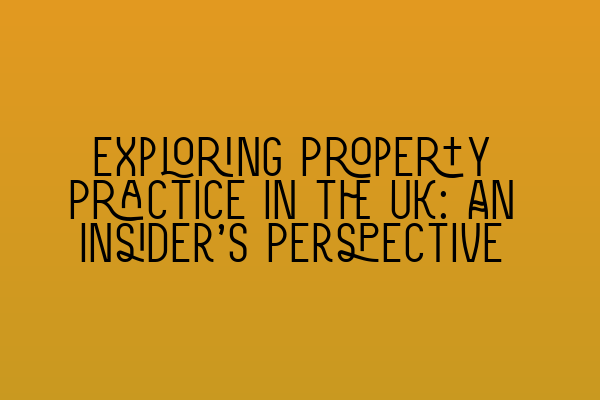Exploring Property Practice in the UK: An Insider’s Perspective
Property law in the United Kingdom is a vast and complex area that plays a crucial role in both the residential and commercial sectors. As a solicitor specializing in property law at SQE Property Law & Land Law, I have had the privilege of gaining an insider’s perspective on this fascinating practice area. In this blog post, I will delve into the intricacies of property practice in the UK, providing valuable insights and shedding light on the key aspects of this field.
Before we delve into the specifics, it is important to understand the fundamental concepts of property law. Property law covers the legal rights and responsibilities associated with real estate and personal property. It encompasses a wide range of transactions, including buying and selling property, leasing agreements, property development, and property disputes.
Buying and Selling Property: Navigating the Conveyancing Process
One of the most common aspects of property practice is the buying and selling of real estate. The conveyancing process, which involves transferring legal ownership from the seller to the buyer, plays a pivotal role in these transactions. From conducting property searches and reviewing title deeds to negotiating contracts and registering the transfer with the Land Registry, solicitors play a crucial role in ensuring a smooth and legally sound transaction.
Throughout the conveyancing process, solicitors work closely with their clients, providing expert advice and guidance. They help identify potential issues, such as restrictive covenants, planning permissions, or disputes affecting the property. By conducting thorough due diligence, solicitors help protect their clients’ interests and minimize the risks associated with the transaction.
To further enhance your understanding of property law and conveyancing, I recommend checking out our SQE 1 Practice Exam Questions and SQE 1 Practice Mocks FLK1 FLK2 articles.
Leasing Agreements: Balancing Landlord and Tenant Rights
Another important aspect of property practice is dealing with leasing agreements. Landlords and tenants enter into these agreements to establish the terms and conditions of occupying a property. Whether it is a commercial lease or a residential tenancy agreement, solicitors are instrumental in drafting, negotiating, and enforcing these contracts.
Solicitors representing landlords focus on protecting their clients’ interests by including clauses that ensure timely rental payments, property maintenance responsibilities, and adherence to property usage restrictions. On the other hand, solicitors representing tenants work towards achieving fair terms, secure habitation, and the enjoyment of property without undue interference.
It is imperative for solicitors to have a thorough understanding of landlord and tenant law, as well as the ability to navigate complex legislative frameworks. This expertise allows them to advise their clients on their rights and obligations, ensuring a fair and balanced lease agreement.
For those looking to expand their knowledge of leasing agreements, SQE Property Law & Land Law offers comprehensive SQE 2 Preparation Courses that cover landlord and tenant law in detail.
Property Development: From Planning to Completion
Property development involves the transformation of raw land into residential, commercial, or mixed-use properties. This process is multifaceted and can involve various legal considerations, such as planning permissions, funding, construction contracts, and sales or lettings of the developed properties.
Solicitors specializing in property development work closely with developers, local authorities, and other stakeholders to navigate the complexities of this field. They ensure compliance with planning laws and regulations, assist in negotiating and drafting construction contracts, and handle the legal aspects of property sales or lettings.
Property development requires a keen eye for detail, strong negotiation skills, and the ability to manage multiple parties involved in the process. Solicitors in this field must also stay updated with the evolving legal landscape surrounding property development, including environmental regulations and sustainability considerations.
If you’re interested in exploring property development further, I recommend taking a look at our SQE 1 Preparation Courses that cover the legal aspects of property practice.
Resolving Property Disputes: The Role of Litigation and Alternative Dispute Resolution
Property disputes can arise from various issues, including boundaries and easements, landlord-tenant conflicts, breach of contract, and property damage. When these disputes cannot be resolved through negotiation or mediation, solicitors may resort to litigation or alternative dispute resolution (ADR) methods, such as arbitration or adjudication.
Solicitors specializing in property disputes are skilled in assessing the merits of a case, formulating legal arguments, and representing their clients in court or other dispute resolution forums. They guide their clients through the complexities of the legal process, ensuring their rights are protected and advocating for a favorable outcome.
If you find property disputes intriguing, you might want to stay updated on the latest SRA SQE Exam Dates to plan your legal career accordingly. Understanding the legal system and gaining practical experience is essential for success in this area of property practice.
Conclusion
Property practice in the UK is a diverse and dynamic field that offers a wide range of opportunities for solicitors. Whether it is facilitating property transactions, drafting lease agreements, managing property development projects, or resolving disputes, property law encompasses a myriad of complex legal issues.
At SQE Property Law & Land Law, we are committed to providing comprehensive training and support to aspiring property law professionals. We offer a range of preparatory courses, including SQE 1 Preparation Courses and SQE 2 Preparation Courses, to equip individuals with the necessary knowledge and skills to excel in this field.
Property law is a highly rewarding area of practice that requires a meticulous approach, excellent communication skills, and a deep understanding of the legal framework. By immersing yourself in the intricacies of property practice, you can embark on a fulfilling and successful career as a property law solicitor.
